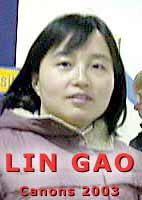China and WTO
By: Lin Gao
 |
The Chinese economy has grown at a high rate since the launch of economic reforms. Economic growth has made China an important player in the international community. One of the most important factors that has contributed to this fast growth is foreign trade. Presently, the Chinese economic system is referred to as a "socialist market economy with Chinese characteristics". That is to say, foreign trade has played a very important role in Chinese economic development. Products manufactured in China make up a large proportion of the world market. |
The World Trade Organization (WTO) is the only global international organization dealing with the rules of trade between nations. The purpose of the WTO is to encourage international trade and dispute resolution. The WTO is the successor of the General Agreement on Tariffs and Trade (GATT) institution. The WTO has radically changed dispute settlement procedures in the international trade area. It governs trade between nations and sets rules for those trading activities. Essentially, the WTO guarantees member countries important trading rights. On the other hand, it also binds governments to keep their trade policies within the agreed limits.
China’s application for accession to the WTO has generated 15 years of negotiation, diplomatic engagement, and scholarly inquiry. The formal application was submitted to the GATT in 1986. In 1986, China applied formally to restore the status of contracting states in GATT. However, both political and economic reasons have prolonged the accession process. Even though the WTO is technically not a political institution, it is clear that a number of events outside the economic realm have shaped the negotiations. In order to become a member of the WTO, China needs to sign agreements with more than twenty other countries, and get approval of 2/3 of the members of the WTO at the ministerial meeting.
On November 15, 1999, China and the United States reached a bilateral agreement as to the terms upon which China may become a member of the WTO. China’s accession into this body took place after over a decade of multilateral and bilateral negotiations with the member countries of the WTO and its precursor, the GATT. The Protocol on the Accession of the People’s Republic of China took place at the Fourth Ministerial Conference of the World Trade Organization in Doha, Qatar on November 10, 2001. The Protocol was accepted by the government of China on November 11, 2001 and came into force on December 11, 2001.
In December 2001, China was formally accepted as a member of the WTO. China’s entry into the rules-based global trading regime is expected to have a significant impact on both itself and on the global economy. The impact of the WTO to China can be summarized by the following:
- acceleration of the reallocation of land, labour and capital resources to participate in the
market-oriented global economy;
- reform of China’s financial infrastructures such as banking, securities and insurance;
- adoption of market-oriented and transparent processes in managing China’s economy;
- small to middle scale of urbanization service industry in China;
- further acceleration of foreign direct investment for sustainable economic development;
- and unprecedented benefit for the Chinese consumers. To the Chinese people, the most important
impact -- an improvement in the standard of living.
The trade liberalization agreements made by China are dramatic and comprehensive. Besides providing
greater access for goods and services, the Chinese government accepted all the WTO’s rules and
regulations — most importantly the principle of most-favoured-nation treatment. The Chinese
government has made liberalizing commitments on all fronts. China will be reducing tariffs, phasing
out non-tariff measures, providing new and increasingly generous tariff-rate quotas on bulk
commodities, eliminating state trading practices, normalizing trade with its own ‘Special Economic
Zone’, eliminating subsidies (while capping and reducing other domestic supports), applying
sanitary and phytosanitary standards based on science, and so on. Many of these commitments have been
implemented and are already enforceable. These wide-ranging reforms have been mandated and scheduled
with the WTO and its members who act as both monitors and potential beneficiaries. China’s
commitments not only cover agriculture and manufacturing, but also service industries such as engineering, telecommunications and finance. In fact, the elimination of market access restrictions in service sectors is as dramatic and rigorous as the commitments made on industry and agriculture. Under the terms of the WTO, China will significantly
improve market access for imports of many products of special interests to many countries.
China’s foreign business law system faces significant pressures to conform to the liberal norms of governance associated with the world market system. In order to comply with the requirements of the GATT and WTO, China has begun a wide-ranging campaign of revising existing legislation and administrative regulations. Substantive law in most economic sectors, including customs, foreign exchange, taxation, securities, intellectual property, enterprise law, bankruptcy, and pricing will need to be revised to conform with WTO requirements. China’s Ministry of Foreign Trade and Economic Cooperation (MOFTEC) announced in May 2002 that more than 2,300 laws and regulations had been amended to comply with WTO rules and 830 abolished since the country joined the world trade body on December 11, 2001.
As the above mentioned, China’s quest to join the Geneva-based WTO took 15 years,
during which time it negotiated dozens of trade agreements with WTO members and changed its legal
and regulatory systems to recognize individual property rights, foreign ownership and other
trade-related activities. Theoretically, WTO membership for China is beneficial not just for China itself but for the world trading community at large. China’s WTO accession provides new opportunities to Chinese enterprise. Accession to the WTO will help China along the difficult path of reforming its economy into one governed increasingly by market forces and the rule of law. For other countries, it will help integrate China more peacefully into the international community and will open up China’s market to increased foreign competition. In any case, WTO accession is in China’s long-term interest.
By: Lin Gao
|

- Read Dean Percy's Introduction Letter for Law Show 2003
- See Law Show Photo Album
- Read Law Show 2003 - a review by Dave Rechlo
- Read Career Student Services Office Update
-
Home Page - Canons
|